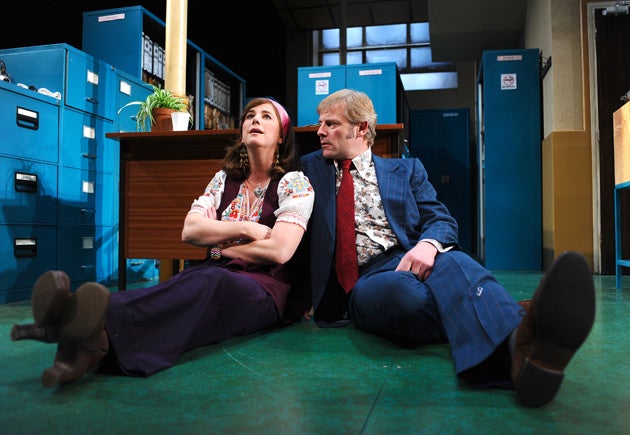Alphabetical Order, Hampstead Theatre, London

Your support helps us to tell the story
From reproductive rights to climate change to Big Tech, The Independent is on the ground when the story is developing. Whether it's investigating the financials of Elon Musk's pro-Trump PAC or producing our latest documentary, 'The A Word', which shines a light on the American women fighting for reproductive rights, we know how important it is to parse out the facts from the messaging.
At such a critical moment in US history, we need reporters on the ground. Your donation allows us to keep sending journalists to speak to both sides of the story.
The Independent is trusted by Americans across the entire political spectrum. And unlike many other quality news outlets, we choose not to lock Americans out of our reporting and analysis with paywalls. We believe quality journalism should be available to everyone, paid for by those who can afford it.
Your support makes all the difference.Hampstead Theatre's 50th anniversary season continues apace without catching fire. Christopher Luscombe's revival of Michael Frayn's delightful 1975 newspaper cuttings-library comedy is fair enough, but not funny enough. It lacks authenticity and conviction, as well as the killer punch of the gusty comic acting, pierced with tragedy, it received in the original Michael Rudman production starring Billie Whitelaw and Dinsdale Landen.
Those roles, of Lucy, the chaotic, tousled librarian and John, the toothy, shambolic leader writer, on a small local paper, are played here by Imogen Stubbs and Jonathan Guy Lewis. Stubbs is eager and bright, barefoot and draped in a £5 fur coat in the manner of a Woodstock hippie, not a dislocated journalistic free spirit. Guy Lewis is too dapper and calculating as he delivers Frayn's hilarious equivocations.
There's something anodyne about all this from the start, which defeats the point of the comedy: the arrival of a new girl, Lesley (Chloe Newsome), as Lucy's assistant, who seeks to tidy up everyone's lives as well as the office. There's a tremendous theatrical metaphor in the new ordering of the work place after the interval, with serried ranks of filing cabinets neatly stacked with boxes and buff folders, desks placed at severe right angles to each other and telephones left ringing because the lunch hour is not quite up. But Newsome's new broom remains curiously enigmatic, not sufficiently dedicated in her mission.
The interchange between Lucy and John is complicated by the incursions of a married reporter, Wally (Michael Garner), and an old-style office fixture, Arnold (Gawn Grainger), writing about shipyards one day, the fish industry the next. One wants to indulge in elopement fantasies with Lucy, the other brings out her maternal instincts.
Also hovering are the features editor, Nora (Penelope Beaumont), who wants to take advantage of the fact that Arnold's wife is in hospital, and a seen-it-all senior messenger, Geoffrey, whom an over-cheery Ian Talbot inexplicably plays as a beetroot-faced refugee from Dad's Army with a satchel slung over his shoulder. You never feel that the deadly daily routines of the job have ever got to these people.
The small-town journalism detail of a bygone age still shines through. Lucy fields a call from the vice-chancellor's wife requesting local cinema times. Wally appears in distress having "spiked" his hand along with the copy. The lost physical arts of galley and page proofreading get a mention.
In pondering the alternative attractions of a secure life in the suburbs and the unavoidable chaos of a lively mind, John and Lucy prove ultimately compatible in the force of their shared intelligence and philosophical objectivity. John, who has acted in time-honoured office style by moving rapidly in on Lesley with a date at the Indian restaurant, has to admit that a long-term relationship is only an outlined proposal with provisional planning permission: human destiny distilled as political reportage.
There's another great speech, well done by Stubbs, about the plague of loose bits of information – Catherine of Braganza, Pitt's first ministry, ablative absolutes, the Dissolution of the Monasteries – infecting the sleepless mind like stray cuttings in a disordered, over-stuffed folder.
And that, if you like, is a mini-metaphor within the larger metaphor, as the play explodes in a joyous dispersal of the cuttings and a surprise conclusion of political solidarity. Janet Bird's design is fitted out with turquoise filing cabinets and piles of old tat that are magically transformed in the scenic editorial during the interval. But this is still a dutiful revival rather than a passionate rediscovery.
To 16 May (020-7722 9301)
Join our commenting forum
Join thought-provoking conversations, follow other Independent readers and see their replies
Comments